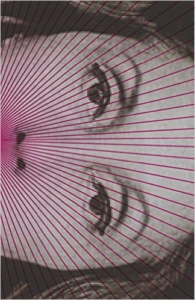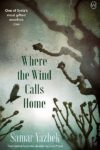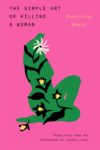 Clarice Lispector (1925-1977) was a Brazilian author whose work is known for its philosophical depth, modernist stylistic tendencies, and keen observations of everyday life. This fall, New Directions published The Complete Stories, which collected Lispector’s short works, written from her teenage years up until the end of her life, in a translation by Katrina Dodson. In honor of this publishing event, Full Stop contributors Becca Rothfeld and Nathan Goldman conducted an in-depth dialogic inquiry into Lispector’s short fiction over email, in which they discuss her embrace of the body, her linguistic innovations, and her interrogations of gender, sexuality, and the boundaries of the human. Please continue to check back on the site to share in their conversation over the course of this week.
Clarice Lispector (1925-1977) was a Brazilian author whose work is known for its philosophical depth, modernist stylistic tendencies, and keen observations of everyday life. This fall, New Directions published The Complete Stories, which collected Lispector’s short works, written from her teenage years up until the end of her life, in a translation by Katrina Dodson. In honor of this publishing event, Full Stop contributors Becca Rothfeld and Nathan Goldman conducted an in-depth dialogic inquiry into Lispector’s short fiction over email, in which they discuss her embrace of the body, her linguistic innovations, and her interrogations of gender, sexuality, and the boundaries of the human. Please continue to check back on the site to share in their conversation over the course of this week.
(Read the first part of the exchange here.)
Hi Nathan,
Thanks very much for this! It’s a very thoughtful take on all of the issues I introduced, and I’m excited to delve further into Lispector’s delicious weirdness with you. (I think you’re right to call her prose “rich” — it feels almost opulent to me, like a multi-course meal. It’s apt, too, that one of Lispector’s persistent fixations concerns the relationship between appetite and satiation. But more on this point later!)
You write that Lispector is skeptical of attempts at “ground-seeking,” and I think that’s right. Your point about language gets at a core paradox that fascinates me: Lispector is an author, thus committed to the efficacy or at least passibility of the linguistic medium, and yet she seems to experience immense discomfort about the sort of stultifying systemization that language inevitably entails. Words, to Lispector, stand in opposition to the more vital textures of experience. I think it’s for this reason that she goes out of her way to craft prose that in some sense undoes itself: she repurposes established phrases, infusing them with renewed novelty, and the resulting language is in some sense an affront to itself, a rejection of its own guiding principles and thus an exercise in disorientation. (I went to a talk given by her biographer and perhaps foremost translator, Benjamin Moser, and he emphasized that Lispector uses words so unusually that she’s near impossible to translate.) But I wonder to what extent Lispector’s project is feasible — to what extent language presents an inescapable limitation, and to what extent flouting a grammar must amount to establishing a new one. Perhaps literature is subject to the same set of constraints that constrain would-be mystics in their daily lives: they’re forced to experience spirituality or meaning as filtered through the lens of materiality, in this case words as visual or aural objects. Or perhaps the two are so wedded to one another they dissolve into each other? But more on this in a moment, when I’ll respond to your comments on the physical and the spiritual.
Re marriage/feminism/men, I think about this often, and I’m not infrequently bothered by it. Lispector’s complaints seem to me to echo the sorts of complaints that many women reiterate today, and they resonate forcefully with the most gendered aspects of my own identity: that men have comparatively paltry emotions, that more is at stake for women than for their male counterparts in most romantic exchanges (“but he was stronger than she . . . he didn’t look back once”), that men are undeserving of the intensity of the love of which they’re the hapless and almost incidental objects (“I can suffer with more intensity than any of you gentlemen. I am superior.”), and so on. Lispector seems to regard men as oblivious, unpossessed of the emotional intelligence and intuition that sets women apart, e.g., “She laughed. He’d be back, because she was the stronger one.” You’re right that she also sees men as characterized by the sort of intellectualism she frowns upon: “I knew what men were like . . . I was the only one he hadn’t managed to destroy with his analyses.” Lispector’s own prose, which surges so powerfully, reads to me as distinctly feminine, in no small part because it so eloquently captures the pangs that have afflicted so many of my female friends.
I’ve long grappled with the notion of “feminine writing,” and I’m wary of the claim that there’s such a thing as a uniquely female tone, but I think there’s some way of accounting for what’s so glaringly female about writers like Lispector (and, I think, medieval mystics like Hadewijch of Brabant, who also write very ecstatically) without positing that stylistic traits map neatly onto physical sex. I think Lispector’s writing is not distinctly feminine so much as typically feminine, which is to say, it figures a recognizable response to a particular culture in which women’s passions and intensities are dismissed as “hysteria” or demonized as “sorcery.” For centuries, mysticism and its rhetoric have presented an attractive means of reclaiming emotion from a common set of enemies. Lispector, Hadewijch, and even contemporary authors like Ferrante are confronted with the same sorts of slights and hostilities, so it only stands to reason that their reactions take something of a common shape. For my own part, I’m not sure whether I think that there’s anything intrinsic to particular gender identities, but I think that the solution I’ve just mapped out defers the necessity of answering that difficult question for a bit.
Now to the physicality/spirituality issue, which is very complex. You write that “the two seem to coexist,” and I suppose I read their coexistence somewhat differently. To me, they coexist insofar as they collapse into one another. I think Lispector is leery of what you (rightly, in my view) call intellectualism in part because she sees it as opposed to the blood-and-guts stuff of a lived, i.e. physical, ecstasy. The examples that you provide show that material developments mirror psychic ones, but I see this relationship as more robust, which brings me back to the notion of appetite and satiation. Lispector seems to conceive of her mysticism as a sort of infusion of climatic passion into everyday events — a fulfillment that is simultaneous with desire, “a hunger born when the mouth is already nearing the food.” It represents the conjunction of want or expectation and satisfaction. Radical physicality is the solution to the problem of language, enabling us to “eat food and not its name,” to fully inhabit our bodies.
For Lispector, what should be is only what is. Here I’ll illicitly sneak in a quote from The Passion According to GH: “When living comes to pass, one wonders: but was that it? And the answer is: that is not only it, that is exactly it.” I think Lispector aims to discover in the anti-climax of the quotidian something newly numinous. Insofar as the chickens are just chickens, humanity would do well to return to its animality: to become “just humans” again. The intellectual posturing that Lispector so disparages is what differentiates us from animals, and it’s what she’d like us to jettison. Animals are characterized by their fervent and almost adoring acceptance of their circumstance: by their pure sensuality. Humans, in contrast, differentiate between achievements and desire (“achievements kill desire,” Daniel says in “An Obsession”), thus relegating reality to a secondary role and elevating desires to a primary one. “The cruelty of the [natural] world was peaceful,” the narrator of “Love” discovers in a garden.
As for humanity, I think that Lispector sees it as a unique sort of animality. I think it’s complex, though, because often the term is employed as something of an insult: sometimes, it refers to our intellectualizing tendencies, which set us apart from animals and, in Lispector’s view, mar us; sometimes, however, it refers to our most creatural aspects. The narrator in Daniel awoke “simultaneously as a woman and a human” because the one term implies the other, and we are “still not worthy” of questions concerning the experiences of flies because we are too over-intellectual for them. Femininity, I think, is an extension of our human animality, though I’m not sure. What do you think?
My last question concerns children in Lispector’s stories. I think the stories in Covert Joy seem to have a different tenor than the stories in Lispector’s other collections: they’re smaller in scope, less philosophical, simpler, and seem to focus more on the phenomenology of childhood. I’m not entirely sure what to make of this. I love Lispector’s grandiosity, but I also find these simpler stories touching — I just don’t know how they fit into the rest of her work.
That’s all I’ve got for now!
Best,
B
—
Hi Becca,
Thanks for your generous and insightful response. Part of the reason that I’ve taken so long getting back to you is that you’ve set us down so many interesting paths that it’s hard to know which to follow and where.
I’ll start with language and its limits. What you call “a core paradox” — that Lispector is an artist of language, yet she’s profoundly critical of the violence language does to the world as it attempts to describe it — fascinates me, too, and I agree that it’s central to Lispector’s poetics. You write that Lispector’s prose “in some sense undoes itself.” This seems right, but I want to try to reach a better understanding of what that means by thinking about Lispector’s unabashed use of more traditional literary forms. Given her fraught relationship to language, one might expect to find in her work a total deconstruction of it — I have in mind Stein’s Tender Buttons or Joyce’s Finnegans Wake or Ashbery’s weirder poems — but, for the most part, Lispector’s words maintain stable relationships to their referents, her sentences follow, and her narratives open, arc, and conclude intelligibly. Lispector’s is a quiet (rather than bombastic) subversion of traditional structures of language and narrative, favoring the uncanny over the simply incomprehensible. In her translator’s note, Katrina Dodson calls this Lispector’s “sly surrealism”: “The logic of a deceptively simple narrative or series of declarations becomes distorted or ends in non sequiturs,” while Lispector’s “departures from standard Portuguese . . . [bend] unknown forms nearly to the breaking point, yet almost always . . . sound right if not correct, as if they ought to exist, or somewhere already do.”
What, then, is Lispector’s project, with respect to language? I think that it’s not to break language or elevate it, but rather to come to a better understanding of it. I think we can give an account of Lispector’s respect for traditional narrative forms and strategies if we read her riffs on and negations of them as somehow revealing aspects of the true natures they had all along. In her explanation of the story “Report on the Thing,” Lispector writes: “I think that I wanted to write an anti-story, an anti-literature. As if that way I might demystify fiction.” I’m fascinated by her choice of verb there: demystify (not transcend, not destroy, not improve). In the same way that Lispector makes strange everyday experience (and thus returns it to its original, authentic strangeness), I think that she makes strange the architecture of language and of narrative — and thus enhances our understanding of how strange it always was. This strikes me as possibly distinct from other similar modernist and postmodernist projects. What do you think? Does this shed any light on Lispector’s relationship to language?
One more thought on this: I wonder how Lispector’s strange use of language relates to her understanding of beauty — a different use for language altogether than naming, knowing, and communicating. In “Gertrudes Asks for Advice,” the doctor “knew you could spend your whole life seeking some thing beyond the mist” and “that the beauty of discovering life is small for those who primarily seek beauty in things.” Can we understand Lispector’s commitment to reworking language as a search for the beauty in things — a beauty that recedes in everyday life and talk? If so, would that be a way of at least naming the paradox in Lispectors’ splendid use of the very medium she critiques as insufficient to the task of conveying the splendor of being?
I love that you link Lispector to the tradition and rhetoric of feminine mysticism, and I agree that she joins that movement in reclaiming a set of experiences and expressions from dismissal and demonization. I agree, too, that an accusation of gender essentialism is unwarranted. In fact, it now seems to me that she’s working with a robust and complex understanding of the ways in which socialized gender roles play a part in gender identity. I’m thinking of the moment in “The Message” when the narrator says of the two characters (a young boy and young girl): “Unformed as they were, anything was possible for them, their qualities were even sometimes interchangeable: she became mannish, and he possessed the almost lowly sweetness of a woman.” Here, Lispector figures gendered attributes as only contingently tied to biological sex and gender identity as malleable. But this androgynous state doesn’t last. The two come upon a house — a strange and loaded object that the narrator describes as “anguish and calm,” “the sphinx,” an “ancient power,” and “the thing itself” — and the girl makes an indistinct sound, prompting the boy to think, “Just like a woman to start crying at a time like this.” Confronted by a cipher for the inexplicability and terror of the real, a thing he cannot comprehend, the boy turns on the girl, asserts his power over her, and accepts the inheritance of his place in a patriarchal system. His actions become a man’s actions; his body, a man’s body, as he “[rescues] himself with the gestures the Masonic brotherhood of men had given him as a crutch and a direction,” leaving the girl to become a woman, “flustered at her bad timing in having breasts and a necklace.” I’m intrigued by this transformation of two androgynous youths into fixed embodiments of their gender roles. Beyond showing Lispector’s understanding of the socialized aspect of gender, it reveals a nuance in her treatment of the female: she’s interested not only in the deep, mystical, authentic power of the feminine we’ve discussed thus far, but also in the feminine as a patriarchal society constructs it to humiliate and subdue women.
I find your argument for the collapse of physicality and spirituality into one another compelling point, and I appreciate and agree with your articulation of that relationship, as well as the way that Lispector makes “fulfillment . . . simultaneous with desire.” I’d like to push back a little on just two points. First: I worry about ascribing prescriptions to Lispector. I hesitate to make the jump from the claim (about which, I think, we’ve agreed) that she critiques intellectualism and celebrates the ecstasy of an embodied spirituality to your claim that “she’d like us to jettison” all that “differentiates us from animals.” To me this implies a certainty that runs contrary to the tenor of the stories, and even to the form of the story. Could you say more about how you understand her work as prescriptive, if you do?
The second point: though I definitely see where you’re coming from, I don’t agree that Lispector’s distinction between the human and the animal lies in our desire for what ought to be as opposed to their acceptance of what is. I’m tempted to take very seriously this claim the narrator makes about the chicken in “A Chicken”: “No one would ever guess she had a yearning.” If the chicken does have a yearning, then when I read the story’s account of what it means for the chicken to be a mother — “Warming her offspring, she was neither gentle nor standoffish, neither cheerful nor sad” — to say not that the chicken is indifferent, but rather that human categories fail to capture the chicken’s actual feeling. (Nor, I think, would Lispector believe that they capture the potential depth of the human’s feeling.) Similarly, in “A Tale of So Much Love,” we’re told that “people as well as chickens possess sorrows and greatness (the chicken’s is laying a perfectly formed white egg) inherent to their species.” Moments like these make me hesitant to accept your interpretation of Lispector’s animal as “pure sensuality.”
I absolutely agree that Lispector speaks of the human to name the worst and best in us. This makes it tough to get a handle of her understanding of what it means to be human in general. Re: Lispector on femininity: I don’t know, either. I agree that it’s “an extension of our human animality,” but I want to add that I’m perplexed by her interest in the sexual dynamics of other species: “The chicken is anxious, whereas the rooster suffers a near-human anguish.” Does Lispector believe that gender is a phenomenon not unique to us? Am I reading her intrusions into animal cognition and social dynamics too literally?
As for Covert Joy, I read these stories as crystallizations of some of Lispector’s obsessions — how small moments change us, how we get indoctrinated into everyday customs and metaphysics, the workings of human desire — into, as you noted, phenomenologies of childhood. In “Boy in Pen and Ink,” the narrator takes boyhood to be an experience of pure presentness and marvels at the adult’s inability to access this experience. The story then traces society’s “domestication” of the boy “into a human,” which will take him “from present time to routine time, from meditation to expression, from existence to life” — including an account of language as a survival mechanism, the cost of which is any chance at true happiness. “Eat Up, My Son” examines the inquisitiveness of childhood and the constrictive un-inquisitiveness of adult life. “Covert Joy” and “Remnants of Carnival” evoke the endless human search for joy. Though they leave some of Lispector’s direct philosophical meanderings behind (with some exception — I’m thinking of “The Waters of the World”), to me these pieces seem continuous with the more directly philosophical work.
Looking forward to your next message!
Best,
Nathan
Becca Rothfeld is a freelance book critic and a graduate student in the history and philosophy of science at the University of Cambridge
Nathan Goldman is a writer living in Minneapolis. His work appears in the Los Angeles Review of Books, The Millions, Word Riot, and other publications.
This post may contain affiliate links.







